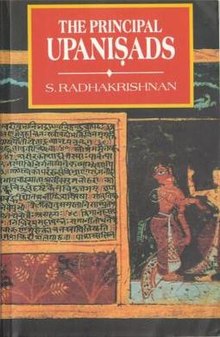
The Principal Upanishads
Swami Nikhilananda, translator and editor. [Dover Edition] One-volume abridgement of the 4-volume Upanishads.
Hardcover $16.95
From the Introduction (The Vedic Knowledge)
Excerpt from the The Principal Upanishads The Vedic Knowledge - The knowledge that was prized the most in ancient India by the rishis was known as Vidya. As a result of this Vidya, or Knowledge of Reality, one attains Bliss and Immortality. It is quite different from ordinary knowledge, which is the product of the intellect. Vidya is a supersenuous and supramental experience.
According to the Mundaka Upanishad, one should acquire two forms of knowledge: the apara (lower) and the Para (Higher). The lower consists of the four Vedas (that is to say, their ritualistic portions) and their six auxiliaries. It deals with the phenomenal universe. The importance of the lower knowledge was admitted by the rishis. It is conducive to a man's material welfare; but its results are impermanent.
The Higher Knowledge is that by which the Imperishable Substance is known. This Imperishable Substance was given the name of Brahman by the Indo-Aryan seers; hence the Higher Knowledge was also called Brahmavidya, the Knowledge of Brahman; and this is the knowledge to which was given the general name Upanishad. Brahmavidya was regarded as the foundation of all other forms of knowledge. Highly treasured by the rishis, it was zealously guarded by them; for they regarded it as more precious than the earth filled with riches. The secret of Brahman could be transmitted only to a qualified disciple. "He who meets with a teacher to instruct him obtains true knowledge." "Only the knowledge that is learnt from a teacher leads to the Highest Good." The qualifications of the aspirant have already been described. "If these truths have been told to a high-souled person who feels supreme devotion for God, and for his guru as for God, then they shine forth - then they will shine forth indeed."
The actual experience of Brahman, which is the culmination of the Higher Knowledge, requires extremely austere disciplines. Only the great renouncers known as paramahamsas, belonging too the highest order of sannyasins, can gain this complete Knowledge of Brahman. For Brahman cannot be perceived or comprehended by the senses or by the intellect that depends on them. Only yoga can give a man that subtle depth of understanding by which the supramental truths can be apprehended. The rishis were adept in yoga. That is why their hearts were open to the secrets of creation and the universe.
The methods of modern physical sciences for the discovery of truth are based upon a different notion of how to search than that which directed the rishis in their realization of Brahman. A scientist seeks to understand the universe through reason based on the knowledge derived from the sense-organs. But the powers of the senses are limited. Therefore he utilizes the aid of various instruments. With the help of the telescope he brings a very distant object within the range of his vision; with the help of the microscope he immensely magnifies a minute object. Similarly other instruments come to the scientist's assistance. The technicians of science are busy, day and night, inventing new instruments by means of which to strengthen and intensify the powers of the senses.
But there exist minute things in the world that cannot be detected even by the most powerful electronic microscope. And the universe is so vast and widespread that its remotest objects would not come within a man's ken even if the largest telescope known to us were to be magnified a million times and directed toward them. The final secrets of the universe will for ever remain unrevealed to physical scientists; for intellect, aided by the senses, is the only means employed by them in their quest for understanding.
The rishis, on the other hand, did not entirely depend upon reason, as this word is usually understood. They developed another faculty of understanding, which is called bodhi, or deeper consciousness. The seeker of Brahmavidya wakened the subtle power of the mind and senses by means of concentration and self-control. By withdrawing the senses from their outer objects, he made the scattered mind one-pointed. This practice of concentration presently endowed it with keenness, depth, and a new intensity, and as the power of concentration increased, the seeker became aware of deeper phases of existence. Instinct, reason, and intuition, or higher consciousness - the three instruments of knowledge - all are differing states of the same mind. Hence a lower state can be developed into a higher. The means to this end, however, are not external instruments but appropriate disciplines directed within.
The Vedic teacher prepared the soil of his disciple's mind before giving him any instruction regarding Brahman. Moreover, there were occasions when the instruction given was not oral. An ancient Sanskrit text says: "The teacher explains in silence and the disciple's doubts are resolved." When a pupil approached the preceptor for instruction, often he would be asked to meditate on the problem and seek the answer from within his own self. And so we read in the Taittiriya Upanishad that Bhrigu came to his father Varuna and asked: "Revered sir, teach me Brahman." Varuna did not give him a direct reply; he asked the boy to practice meditation and austerities. Bhrigu followed this advice and came to the conclusion that food alone was Brahman. He was asked to meditate again. This time he realized that prana alone was Brahman. His father exhorted him to concentrate further. At last the nature of Brahman was revealed in Bhrigu's heart and he realized that Brahman is Anandam, Bliss Absolute.



